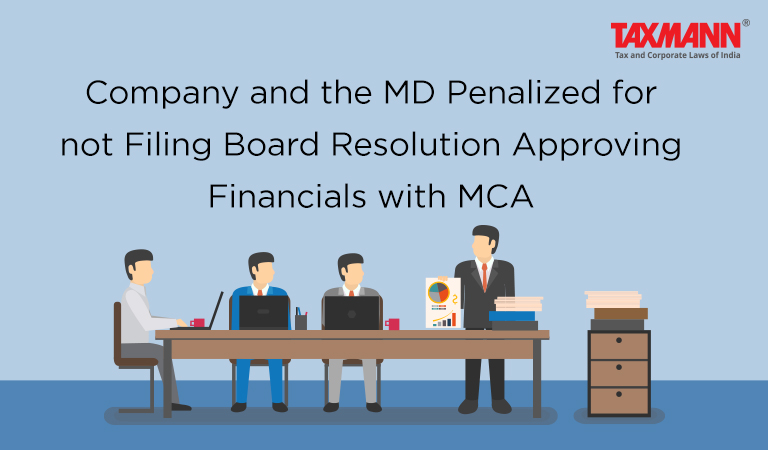Company and the MD Penalized for not Filing Board Resolution Approving Financials with MCA
- Blog|News|Company Law|
- 2 Min Read
- By Taxmann
- |
- Last Updated on 4 April, 2023

1. Background of the case
This is a case in which the Registrar of Companies/Adjudication Officer of Chennai passed vide his adjudication order F.No.ROC/CHN/Shri.Narayani/ADJ Order/S117 (3) (g) /2022 dated 20th December 2022 for violation of provisions of section 117(3)(g) of the Companies Act 2013 in respect of Shri Narayani Nidhi Limited order of adjudication of penalty passed under section 454 of Companies Act 2013.
Against the order of the Registrar of Companies of Chennai, an appeal was filed by Shri Narayani Nidhi Limited challenging the penalty of Rs. 11,15,400 levied, before the Regional Director (Southern Region) Ministry of Corporate Affairs, Chennai. Upon hearing the appeal, the Regional Director slashed the penalty amount from Rs.11,15,400 to Rs. 3,00,000 and we shall go through this case in detail in order to understand the rationale behind the reduction in penalty granted by the Regional Director.
2. The Company
M/s Shri Narayani Nidhi Limited incorporated on 13th July 2012 under the provisions of the Companies Act 1956 having its registered office at No.28A, Kamalalayam Vadakarai, Tiruvarur in Tamil Nadu. The company falls under the jurisdiction of the Registrar of Companies of Tamil Nadu and the office of the Registrar is situated at Chennai. The company is having five directors on the board and one of them is a managing director. The company also have two KMPs in the whole time employment of the company i.e. company secretary and chief financial officer. The company being a Nidhi company, its services are on various deposit schemes such as savings deposits, fixed deposits, term deposits, daily deposit schemes and also providing jewel loans, mortgage loans, secured loans etc.
3. Gist of the adjudication order passed by the Registrar of Companies – Chennai
As per the provision of section 179(3)(9) of the Companies Act 2013 the board of directors of a company shall exercise the powers on behalf of the company by means of resolutions for passing at meetings of the board, approving the financial statement and the board’s report and such resolution approving financial statement is required to be filed with the Registrar of Companies in form MGT-14 and the company defaulted by not filing the same for a consecutive period of five years.
The company failed to file the MGT-14 form for board resolution passed for approval of financial statements of the company for the year ending as at (a) 31st March 2015; (b) 31st March 2016; (c) 31st March 2017; (d) 31st March 2018 and (e) 31st March 2019. The Registrar of Companies after following due procedure of law, passed an adjudication order penalizing the company for Rs. 8,65,400 and its managing director for Rs. 2,50,000 making a total penalty of Rs. 11,15,400 for the violation of section 117(3)(g) of the Companies Act 2013.
Click Here To Read The Full Article
Disclaimer: The content/information published on the website is only for general information of the user and shall not be construed as legal advice. While the Taxmann has exercised reasonable efforts to ensure the veracity of information/content published, Taxmann shall be under no liability in any manner whatsoever for incorrect information, if any.

Taxmann Publications has a dedicated in-house Research & Editorial Team. This team consists of a team of Chartered Accountants, Company Secretaries, and Lawyers. This team works under the guidance and supervision of editor-in-chief Mr Rakesh Bhargava.
The Research and Editorial Team is responsible for developing reliable and accurate content for the readers. The team follows the six-sigma approach to achieve the benchmark of zero error in its publications and research platforms. The team ensures that the following publication guidelines are thoroughly followed while developing the content:
- The statutory material is obtained only from the authorized and reliable sources
- All the latest developments in the judicial and legislative fields are covered
- Prepare the analytical write-ups on current, controversial, and important issues to help the readers to understand the concept and its implications
- Every content published by Taxmann is complete, accurate and lucid
- All evidence-based statements are supported with proper reference to Section, Circular No., Notification No. or citations
- The golden rules of grammar, style and consistency are thoroughly followed
- Font and size that’s easy to read and remain consistent across all imprint and digital publications are applied



 CA | CS | CMA
CA | CS | CMA
